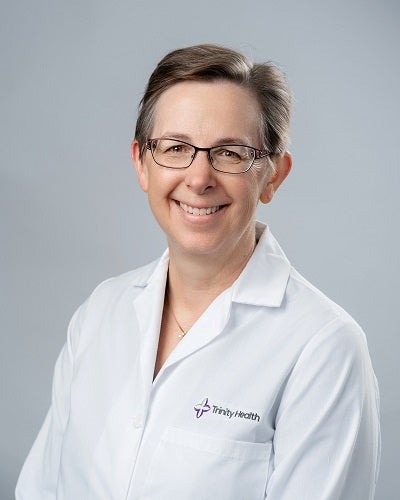It's RSV Season! A Pediatrician Tells Parents What They Need to Know
October 17, 2023Kara Morley-Smolek, MD, is a Board-certified pediatrician who practices at Trinity Health Medical Group, Primary Care & Pediatrics – Rockford and Trinity Health Grand Rapids. Dr. Morley-Smolek participated in a Q&A about Respiratory Syncytial Virus (RSV) where she shared some actions parents can take to keep their children healthy and what they should do if they contract the virus.
Q: What is RSV?
Dr. Morley-Smolek: Respiratory Syncytial Virus, or RSV as it is commonly referred to, usually circulates in Michigan in the fall and winter. For most children and adults, it causes what we consider to be a common ‘cold.’ In a ‘normal’ RSV year, the people with the most severe illness are children under 6 months of age. Prior to the pandemic, most children were exposed to and had RSV by the age of 2 years.
In more severe cases, RSV can cause a severe cough, wheezing, and difficulty breathing. Infants who were born prematurely, have underlying chronic lung disease, or have heart disease are at higher risk of getting a more severe illness.
Q: How can I avoid getting RSV? Can I protect my children from it?
Dr. Morley-Smolek: It is hard to completely avoid RSV unless you never leave your home and you have no visitors. For older and school-age children, I recommend teaching them good hand-washing skills and coughing into their elbows rather than their hands, to reduce transmission from one person to another. Adequate sleep and healthy eating habits can help keep immune systems strong but won’t necessarily protect you from RSV.
For my youngest patients, I recommend trying to avoid situations where there are many people, particularly younger and school-age children. For families with infants and children who attend daycare or school, I recommend the older kids change their clothes once they are home and wash their hands well.
Q: What should I do if my child gets RSV? Do I need to go to the Emergency Room?
Dr. Morley-Smolek: Most children won’t need to be seen by a health care provider. We recommend supportive care; for infants, that means nasal suction if there is a lot of nasal mucous. Nasal saline spray can also help decrease congestion. Staying hydrated is more important than eating. Appetites will come back as the child’s health improves.
There is no cold medicine that has been proven to be effective against RSV or its symptoms. Cold medicine can be unsafe for children under 6 years of age — so we don’t recommend that as a treatment. We also don’t recommend antibiotics since they have not been found to be effective against RSV.
The signs of needing to see a doctor would include a worsening cough or having trouble breathing, not drinking, or a decrease in wet diapers. If the child is breathing faster than normal or if you can see their ribs as they breathe in and out, then they should be seen by a doctor. You can always call the Nurse Advice Line 24 hours a day, and they can help you decide if your child should be taken to the Emergency Department.
Q: Is there a vaccine for RSV?
Dr. Morley-Smolek: There is an approved antibody shot (Beyfortus) available for children under 8 months of age during the RSV season. This is not a vaccine though. The antibody shot should give protection throughout the RSV season. It has been shown to be safe and effective at preventing severe illness from RSV.
There is a vaccine that has been approved for pregnant mothers. If given two weeks prior to delivery, the mother will transfer the protective antibodies to the infant, and they will both be protected throughout the RSV season.
If you have health concerns or questions about RSV, the best thing you can do is speak with your primary care provider. Click here to find a provider near you.




